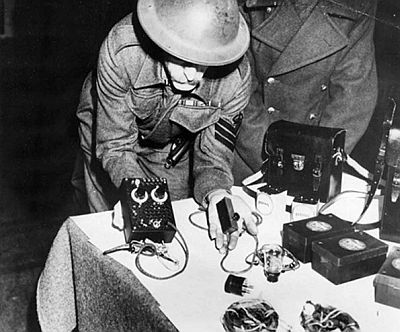- Joined
- Oct 11, 2010
- Messages
- 12,706
- Reaction score
- 7,459
- Age
- 61
The first executions under the Treason Act took place on 10th December 1940. Jose Waldberg, 25, a German national, and Karl Heinrich Meier, 24, a Dutchman of German origin, were hung at Pentonville Prison following their conviction at the Old Bailey in November.
Waldberg and Meier had landed at by rowing boat at Dungeness on the Kent coast on the 3rd September 1940. They had been escorted across the Channel and only had to row the last distance up to the shore.
It was intended that they would pose as refugees and move around the country reporting on British troop movements and military installations. They had a substantial amount of cash that was supposed to sustain them until the German invasion, which they were told was to be on the 15th September. They would then make themselves known to the Germans with a secret password.
They did not get far. Meier was apprehended when he tried to get into conversation with an ARP warden who promptly asked for his Identity Card. When Waldberg said “we have only just arrived†he not only aroused further suspicion but gave away the fact that he was not alone. The police were called. After a short interrogation he led them to Waldberg.

The authorities display the radios carried by Waldberg and Meier. The German Abwehr had supplied them with radios that could transmit but not receive.
Two others German spies who arrived further along the coast the same day got no further. Kieboom and Pons were seen landing, and the police were called when they asked locals where they were. Kieboom was executed a week after the other two. Pons was able to successfully argue that he had been coerced into the role, having been threatened with a concentration camp by the Germans, and had always intended to give himself up.
Waldberg and Meier had landed at by rowing boat at Dungeness on the Kent coast on the 3rd September 1940. They had been escorted across the Channel and only had to row the last distance up to the shore.
It was intended that they would pose as refugees and move around the country reporting on British troop movements and military installations. They had a substantial amount of cash that was supposed to sustain them until the German invasion, which they were told was to be on the 15th September. They would then make themselves known to the Germans with a secret password.
They did not get far. Meier was apprehended when he tried to get into conversation with an ARP warden who promptly asked for his Identity Card. When Waldberg said “we have only just arrived†he not only aroused further suspicion but gave away the fact that he was not alone. The police were called. After a short interrogation he led them to Waldberg.

The authorities display the radios carried by Waldberg and Meier. The German Abwehr had supplied them with radios that could transmit but not receive.
Two others German spies who arrived further along the coast the same day got no further. Kieboom and Pons were seen landing, and the police were called when they asked locals where they were. Kieboom was executed a week after the other two. Pons was able to successfully argue that he had been coerced into the role, having been threatened with a concentration camp by the Germans, and had always intended to give himself up.



